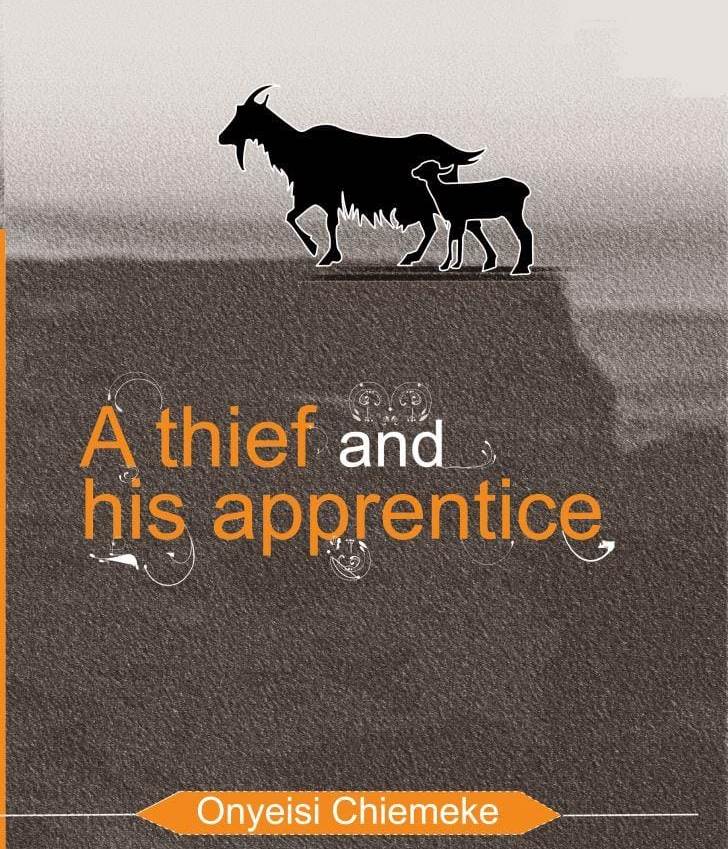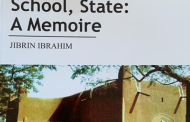Book Review
Title: A Thief and His Apprentice
Author: Onyeisi Chiemeke
Publishers: Maroon Square
Year of Publication: 2022
Number of Pages: iv – 185
Reviewer: Chijioke Uwasomba
The Nigerian crisis has deepened so much with devastating impacts on the people and the country itself. Many otherwise hopeful and patriotic citizens are beginning to doubt the possibility of the country surviving, having been consistently and continually ravished by an irresponsible and thieving class that has held the country hostage for years. As far back as 1991, General Ibrahim Babangida, the then Dictator who held sway, had admitted in a moment of dubious surprise during an interview with The Daily Times surprise that the Nigerian economy (and by necessary implication, the Nigerian state) had not collapsed given the level of mismanagement the country had suffered in the hands of its ruthless minders which, ironically, he was leading at that auspicious time in the history of Nigeria. It is unbelievable that corruption and other nation – destroying gambits have been at play in the life of the country thereby reversing all genuine moves and efforts of the counter – elite. In a moment of crisis especially the type that has beset Nigeria, literature has always a historic role to play in charting a way in the resolution of the contradictions. It is in recognition of the avant-gardist role of literature in a time of tyranny like the one currently ravaging Nigeria that Onyeisi Chiemake, a lawyer and radical human rights activist with a Marxist inclination has come out with his debut novel, titled A Thief and His Apprentice. The setting of the work is Nigeria and all the issues speak to the hopeless and helpless condition of the country owing to the lackluster performance of its ruling group. In nine chapters, Chiemeke launches a devastating attack and rebuke on the politics of the country, its economy, the civic responsibility of the people, and many other problems that the country is confronted with.
Chapter one is titled “Sowing Seeds”, indicating the noises and hollow promises that politicians in no-colonial environments like the one being portrayed by the writer make. The speech that introduces the chapter gives off the political gathering which is a political campaign as a bacchanal affair reeking of recklessness and idiotic arrogance. Every display of the political leaders in their campaign is anchored on power. The narrator describes it thus: “Power is like the stock market, if you do not invest, you will not get bonus or dividend. And how much you invest determines how much you get” (4).
The narrator takes the reader through his journey with his boss (Chairman) on how to “sow seeds in the pursuit of earthly things”. Seed-sowing is a by-word for corruption. The narrator’s Chairman himself was coached by the latter’s uncle who was a senior person in government. Having learnt how to be involved in the wheeler-dealer business of contracting and all the seed-sowings that go with it, he is also teaching the narrator and socialising him into the game. It presupposes that seed-sowing becomes a chain which satisfies the filthy-lucre mentality of the corrupt elite who through their reprehensible activities destroy the country. The hotel where the delegates converge on to elect the party’s candidate for the chairmanship of the Local Government is called Hotel De Chop (another satirical barb). Chief Okopiko announces that the highest bidder will get the ticket of the Party. He sees it as a bazaar: “Let me then say that the highest bidder will get the ticket… Party delegates should not be alarmed, we shall distribute 50% of the auction sale to you all, and the Party will keep the remainder of 50%…” (9). Those in power are “holding a fertile cow with plenty milk” (13). They milk it to their satisfaction.
In the second chapter – “Fiefdom”, the Minister of the Ultimate Church of God is no doubt different from his counterparts in the political terrain in spite of his pretentions to the contrary. In his encounter with the street urchins on a Lagos road where one of his tyres has gone flat, the boldness of these characters, their dare-devilry and other criminal displays, the Minister does not need anyone to convince him that things have gone terribly bad in the country. The urchins exude raw power like those who occupy state power in the name of democracy.
In chapter three, “A Thief and His Apprentice”, Titus, the son of Chief Gbonka, the Baale of Ajadi visits a master thief asking to be his apprentice as a thief. In the course of their discussion, he is told that: “stealing is an honourable institution that should not be destroyed with outlandish behaviours” (37). Titus’ master tells him: “man’s heart, is capable of dressing up excreta and passing it off on a platter as manna delivered by the Almighty God” (48). He is a leading member of the United Thieves Club and very proud of it.
Chapter four which is “Twisted” presents the narrator as a man in a really twisted condition more so as he talks like one hallucinating and complaining about the entire ills bedeviling the system. The rants of the narrator have the capacity of engendering revolutionary consciousness.
“The Governor’s Gift” is the focus of chapter five in which an undeserved gift is given to a judge. Gregory Ikpiso is meant to give the judge a bribe of One Hundred Million Naira (N100M) from the Governor but in his greed he delivers Five Million Naira (N5M) to the Judge. Engenia, the Governor’s wife supports her husband – governor because of what she enjoys as the First Lady, not minding her husband’s indiscretion. The rape charge against the governor is struck out because of the gratification the Judge had already received.
Chapter six “The Ill-fated Goat” is a continuation of the evil of power as it is described as having a face that is as ugly as that of a goat. The First Lady’s sister who has been in a drug rehabilitation centre for about five years is made a candidate of the ruling Congress for Stability Party (CSP) for Koko LGA without any recourse to internal democratic principles of the Party.
In chapter seven – “Memory of a Signpost”- the narrator’s father dies as he is coming from his lover’s place and falls into a ditch. The road on which he falls into the ditch that leads to his death has been awarded many times for reconstruction which only exists on paper. The money for the Omomi Street rehabilitation is shared by the powers that be and a certificate of work done is issued to the company, Angel Company Ltd.
The eight chapter which is titled “The House Fly” dwells on His Excellency, the Governor of Potty State who likes to enjoy flattery. The Governor and his gang go about taking people’s lands with impunity. The Governor’s Chief of Staff lies to the people whose land is being taken over from to exercise patience. One of the aides of the Governor describes power as: “… Your Excellency, power is an unruly horse, if you do not have it, it may kick you at the groin. If you ask me, we can have the money and the power. Why give power to those who may crucify us…” (146).
The last chapter is titled “The Hare’s Burrow”. This chapter is about the Lord’s Temple which is an association of crooks that is used to put people in power. The Exchequer, a member of the group makes the mistake of petitioning the Ombudsman and pays for it direly. His petition borders on how the sum of Three Hundred and Fifty-Four Naira (N354m) loan which was taken from the World Bank by the Kanka State Government was stolen by state agents. The Lord Chancellor and members of the Lord’s Temple end up sharing the money leading to the expulsion of the Exchequer, who is also a corrupt member of their group. As a result of their misunderstanding with the Exchequer, they go ahead to found another group known as the Synagogue Temple to continue with their sinful ways. In the society of these characters, everything is reduced to stealing and exploiting the people.
Everything about A Thief and His Apprentice speaks to the Nigerian post-colonial hell-hole, a dark and darkling highway with all its ferocious and life-destroying antics and proclivities. There is no doubt that Chiemeke’s creative consciousness is driven by a post-modernist temperament as the work adopts a style that may appear loose in its framework given its episodicity. This should not be seen as a structural weakness as the heaviness of the burden that gave vent to this work is mind-bugling and utterly crippling. After all, fixities have become fragments as the kaleidoscope of collective experience is in motion. What appears as fragments, if deeply and fully explored can become whole in its comprehensive totality.
Chiemeke, through this entry, works hard at parodying the Pentecostal Christian faith and the politics of our country as expressions like “sowing seeds”, “giving unto God”, “God’s protection”, “begotten son”, “sowing seeds to the glory of power”, “the power of a Pastor”, “Angels of power”, etc., become freely used to point out how both the spiritual and the secular have become tools of exploitation and misdirection in the country. Democracy becomes likened to the “Ochanja” market (Ochanja describes the fakery and dubiety of the entire Nigerian life) where anything can be bought and sold.
The work is a burlesque of the politics, governance system and the quotidian realities of Nigeria. Contract quotations are given or meant to be given to the governor, his wife and concubine(s), the daughter(s), the son(s), the Commissioner(s), Party Chairman, other cronies and the civil servants who oil the illicit processes that governance has become. The leitmotif of the work is power, power and all the absurdities that go with it in a neo-colonial, peripheral and decadent country like Nigeria.
In an effort to give Nigerian aesthetic flavour to his work, the writer employs a large dose of local proverbs and other Nigerianisms to flesh up his story and deepen the reader’s knowledge of the shenanigans happening in Nigeria without let or hindrance. The influence of Charles Dickens, Festus Iyayi (especially) Iyayi’s Contract), Bernard Shaw and even Chinua Achebe is very noticeable in A Thief and His Apprentice.
The encounter between the British colonial power and the peripheries has produced many Englishes and the Nigerian variety is such a robust one that has stunned the original owners of the language. This work is rich in its tonal inflections and other lexical orderings with Nigerian background to boot.
Chiemeke did not study creative writing in a formal setting and neither did he take a degree in Literature but his rich exposure to literature and other types of writing has imbued him with bubbling capacities to engage humanity in various ways and forms. He is a writerly – critic who is so much concerned about his dying country run by a bandit class masquerading as a ruling class. This class and its ilk are like dubious merchants trading in the commodity of power.
A Thief and His Apprentices is a textualisation of what Chiemeke has experienced, seen and felt and known as a conscious student, an activist, human rights worker and crusader, radical lawyer and a Pan-Africanist with a deep sense and understanding of Nigeria and the world order. It is meet to state that with the publication of A Thief and His Apprentice, Chiemeke has begun a journey on the deeply productive wings of poesy powered by his redoubtable muse and there is no limit to his prodigious soaring and acclaim.
Dr. Uwasomba, the reviewer, teaches Enlglish @ the Obafemi Awolowo University, Ile-Ife in Nigeria




























